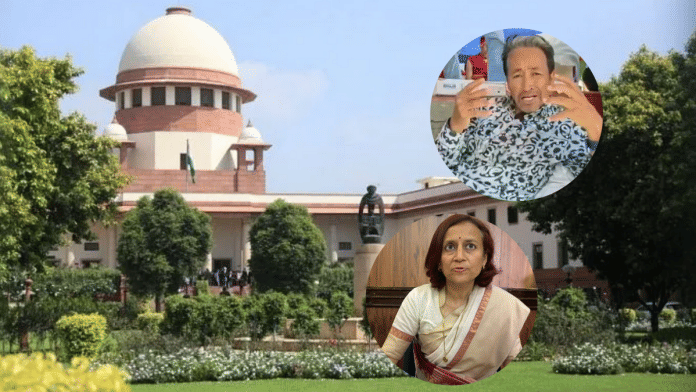New Delhi: The Centre and the Union Territory of Ladakh Monday accused activist and education reformer Sonam Wangchuk’s wife, Dr Gitanjali J. Angmo, of creating “hype” and an “emotive” atmosphere regarding her husband’s detention, who is in preventive custody under the National Security Act (NSA).
Solicitor General Tushar Mehta expressed reluctance to share the grounds of his arrest during proceedings at the Supreme Court, where Angmo has challenged Wangchuk’s detention, terming it illegal. Mehta informed a bench of Justices Aravind Kumar and N.V. Anjaria that the same had been disclosed to Wangchuk, and that no provision in law requires the detaining authorities to share it with the family.
Wangchuk is currently in detention at the Jodhpur Central Jail, Rajasthan. He was taken into custody on 26 September, two days after protests in Leh demanding statehood and Sixth Schedule status for Ladakh left four people dead and 90 injured in the Union Territory.
Angmo has challenged the detention as illegal under Article 22 of the Indian Constitution, as no grounds of arrest have been supplied, and under Article 32 as a habeas corpus petition seeking the release of Wangchuk.
During the hearing, Angmo’s lawyer, senior advocate Kapil Sibal, pressed for an interim order to supply grounds of arrest to his client.
However, the court refrained, observing: “At this stage, we will not say anything.” But the bench verbally asked Mehta the reason for not disclosing the grounds of arrest to Angmo.
The solicitor replied by saying there was no legal mandate and that Angmo was trying to create a new ground to challenge Wangchuk’s detention by raising the issue of non-supply of reason for detention.
At the bench’s persuasion, Mehta agreed to examine the feasibility of serving the grounds of arrest to Angmo.
Sibal then raised the interim relief for medical support for Wangchuk, to which Mehta responded that when the detainee was produced for medical examination, he denied being on any medications.
Mehta went on to assure the bench that all medicines, if any, would be provided to Wangchuk and remarked that the petitioner was trying to “create a hype and an emotive issue that the detenu was denied medical relief and meetings with his wife.”
Mehta said that many of the allegations in the media have been raised by the petitioner with an intention to create an emotive atmosphere: “This is all just to portray in the media and in that region that he is deprived of medicines and access to his wife. Just to create an emotive atmosphere. That’s all.”
The bench addressed Angmo’s complaint that she was denied visitation to Wangchuk, saying that if the prison rules allow, she will definitely get access.
When the court issued notice to the Centre and Union Territory of Ladakh and fixed 14 October for the next hearing, Mehta argued that Angmo might modify her petition to challenge her husband’s detention later.
However, even as it deferred the hearing, the bench asked Sibal why Wangchuk did not move the high court first.
As the proceedings ended for the day, Sibal and Mehta engaged in a heated discussion. “We know what is going on,” Mehta said. Sibal responded by saying, “We also know what’s going on.”
But a quick intervention by the bench signalled a closure of the proceedings.
“We don’t know what’s going on,” said Justice Kumar, as he indicated to his court staff to call out the next case.
(Edited by Insha Jalil Waziri)
Also Read: Sonam Wangchuk & NSA: A look at 1980 law, preventive detention & role of ‘subjective satisfaction’






